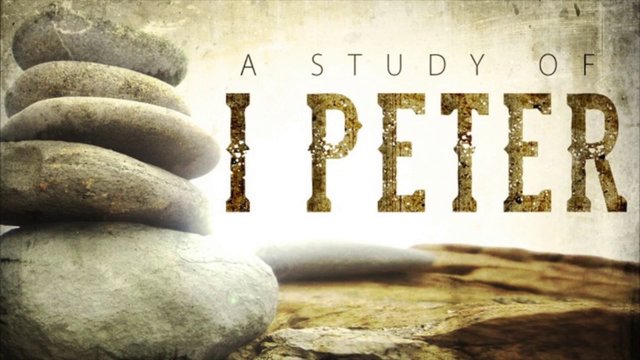For the summer, we will be walking through 1 Peter and 2 Peter. Both of these epistles are part of the “catholic epistles” (along with James, John’s letters, and Jude) because, unlike Paul’s letters, these letters are addressed to the entire universal church rather than to specific congregations experiencing specific issues. For our study, all you need is a Bible, preferably a study Bible. I will be using The Jewish Annotated New Testament, which seeks to highlight and bring out the New Testament’s Jewish roots. If you want to go a little deeper into the themes of the letters, Luke Timothy Johnson’s The Writings of the New Testament provides a good overview of these letters. I will also be using Ben Witherington’s Letters and Homilies for Hellenized Christians, Vol. II as part of my preparation for our study.
Introduction:
The occasion for this letter is the present suffering of Peter’s audience and his appeal to their baptism to see them through. Many commentators read this letter as being a baptismal homily that has been placed in the form of a letter. Peter’s exhortation is for them to remain firm in their faith as they recall their baptism. The letter is short and compact. If you have twenty minutes, please take the time to simply read through the entire letter.
The Salutation: (vv.1-2)
Peter opens his letter with a salutation found in vv.1-2. In this introduction, Peter simply introduces himself as an “apostle” meaning “one who is sent” or “messenger.” This is the same term Paul uses in his introductions to describe himself as well. The geographic areas mentioned in verse 2 are all located in Asia Minor near the Black Sea. It is thought that this letter was originally sent to be circulated in this area.
1 Peter is rich with allusions to the Hebrew Scriptures (Peter was Jewish), and we see two of these pronounced allusions in this introduction. Peter describes his audience as “exiles in the Diaspora.” This reference, of course, is to the dispersion of the Israelites, first when the northern kingdom of Israel fell to Assyria in 722 BC (2 Kings 17:9) and next when the southern kingdom of Judea fell to the Babylonians in 586 BC (2 Kings 25:11, 26). The prophets will later promise that God will gather up the dispersed tribes under his Messiah. (Ezek. 37:21-24, Jer. 31, Zech. 10). Peter wants to remind his audience that God’s people are a people of the exile. As Jesus informed Pilate “My kingdom is not of this world.” (John 18:36). But Peter also wants to remind us that we are to look forward to that coming kingdom under Christ’s reign when all will be gathered up. (Mark 13:27).
The second allusion in the introduction is to the ratification of the (Old) Covenant (of the Law) on Mt. Sinai in Exodus 24. On Sinai, God not only gives Moses the Ten Commandments but other laws concerning the protection of people and property and the proper worship of God. Moses gives these laws to the people who respond “All the words which the Lord has spoken we will do.” (v.3). The covenant or contract between God and his people is sealed, ratified, and approved through a sacrificial thanksgiving offering. Half of the blood of the offering is sprinkled on God’s altar (v.6) and the other half is sprinkled on the people (v.8). It is through this action that the Covenant is sealed. Peter is telling his audience that it is Jesus’s blood which seals the New Covenant of Grace. (And, of course, it is this sealing of the New Covenant in which we participate at the Great Thanksgiving (Luke 22:20).)
The Blessing: (vv. 3-12)
The first exhortation (vv. 3-12) is one of the most uplifting portions of Scripture. Peter begins by encouraging his audience to rejoice in the blessings of God’s grace that comes through our being born anew in baptism. Our joy is because (1) We have a living hope given to us through a living God as demonstrated in the Resurrection, (2) We have an inheritance that is imperishable, undefiled, and unfading which cannot be taken away, and (3) We have a salvation that will be fully revealed (Gk: apocalypse) at the end (Gk: eschaton) of time (Gk: kairos). Therefore, no matter the present difficulties, our joy can never be taken away because our joy doesn’t rest in our present circumstances.
Within this exhortation, Peter writes that “Without having seen him, you love him, though you do not now see him, you believe in him.” (v.8). Recall the story of the Risen Jesus and Thomas (John 20:24-29), and the blessing that Jesus gives to those who believe but who have not seen. This is the blessing of which Peter is now speaking. He praises the faith of those who were not eyewitnesses or even the faith of those who see through the glass dimly. It is a faith that continues to exist even through tribulation.
Peter ends his initial exhortation by placing his audience within the cosmic history of salvation. (v.10-12). He reminds his audience (and us) that the prophets of the Hebrew Scriptures looked forward to the coming of the Messiah, with the understanding that the prophets’ words were not for them but for those to whom God’s Messiah would reveal himself. He reminds his audience that the angels in heaven longed for the day of the Messiah, and for those who would answer the Messiah’s call. He reminds his audience that the Holy Spirit was sent from heaven to spread the Good News to those whom God called. He reminds his audience (and us) that they are them.
Dinner is at 6. The menu is meatball sub. Discussion about 6:45. For 1 Peter, our discussion will be led by Pastor Joshua Sorrows. Compline at 8.
Rejoice always with inexpressible joy that is filled with glory.
1 Peter 1:8

